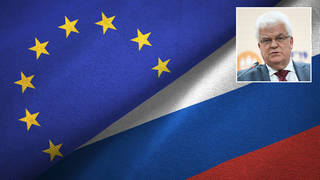



A fresh report on EU-Russia relations released by the European Parliament is a futile attempt to influence this weekend’s parliamentary elections in the continent’s largest country, Moscow’s top envoy to Brussels has alleged.
On Thursday, the bloc’s lawmakers approved a document outlining the EU’s relationship with Russia. It was prepared by former Lithuanian PM Andrius Kubilius and passed by a 494 to 103 vote, with 72 MEPs abstaining. It’s important to note that setting foreign policy is a function of member states and not parliamentarians in the Belgian capital.
Russia’s Permanent Representative to the EU Vladimir Chizhov blasted the report on Sunday, calling it biased, factually wrong and, in his view, aimed at swaying votes in the ongoing parliamentary elections in Russia. If that was the intention, nothing would come out of it, the diplomat predicted, saying that Russian people “are conscious and politically educated enough not to fall for such a move.”
“This entire resolution has this common thread that the government, the president, the parliament are all bad. And there are good democracy-thirsty Russian people, whom the MEPs want to direct toward the light,” he said.
I am certain that many in our country will find this hubris insulting to their intelligence and capacity for independent thinking.
Chizhov believes the adoption of the non-binding resolution was timed to coincide with legislative elections, which Russia is holding this weekend.
The EU report contains a laundry list of grievances it has toward the Russian government, some of which are simply factually untrue, according to the Russian envoy. For example, it states that “the collapse of arms control with Russia (e.g. withdrawals from the Intermediate-Range Nuclear Forces Treaty and the Treaty on Open Skies) and the lack of progress on nuclear disarmament…is of great concern for the security of European citizens.”
Russia indeed abandoned the INF Treaty and the Open Skies treaty, but in both cases the US was the party that initiated the situation. Russia and the US significantly reduced their respective nuclear arsenals under the bilateral New START treaty.
However, that agreement was almost scrapped by former American leader Donald Trump and renewed at the last moment by his successor, Joe Biden. The EU report omits those facts, implying that the collapse was Russia’s fault and part of a wider Russian military buildup threatening other European nations, Chizhov highlights.
The MEPs offered a long list of recommendations to the EU and member states on how they should treat Russia, proposing sanctions, the reduction of trade and other measures. Among them was a proposal “not to recognize the Parliament of Russia” after it is sworn in and suspend Moscow from international organizations with parliamentary assemblies, suggesting that the ballot could be “recognized as fraudulent” by the EU. The bloc should also pressure on the country to change its election procedures, the document directed.
The Russian ambassador said such recommendations were clearly directed at meddling in Russia’s domestic affairs. Ironically, the document accused Moscow of conducting hostile political interference in other countries.
For example, RT, together with the Sputnik broadcaster, were accused of promoting the concept of the ‘Russian World’ “in the native languages of the EU Member States” and trying to “rehabilitate Russia’s image in the eyes of the EU population, particularly via the promotion of the Sputnik V vaccine” against Covid-19.
Chizhov said he saw a silver lining in the fact that 175 lawmakers refused to support the resolution, indicating that “some MEPs still have reserves of common sense.”
